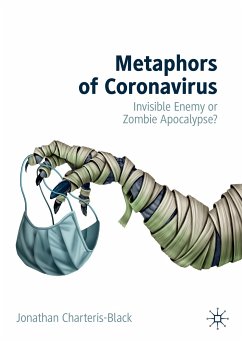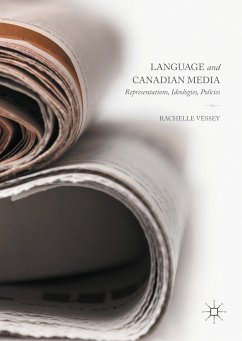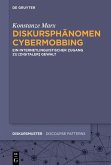"In this timely, wide-ranging and inspiring book, Jonathan Charteris-Black provides detailed and critical insights into the key roles played by metaphor and metonymy in framing the debate around the Covid-19 pandemic. He shows how, through their strong appeal to emotion, metaphors and metonyms form part of an 'overt moral coercion' which reduces the agency of those living through the pandemic. This book deepens our understanding of the ways in which the use of metaphor and metonymy can be used to shape behaviour, providing important insights into the collective experience of the pandemic. The chapter on metonymy is particularly illuminating as it highlights the different ways in which thought and behaviour during the Pandemic have been influenced by this highly subtle and nuanced form of communication which has been employed both in verbal format and through the use of images."
-Jeannette Littlemore, Professor of English Language and Applied Linguistics, University of Birmingham, UK
"This is a highly engaging, personal and lucid analysis of the figurative language used in the COVID-19 pandemic to 'make sense' of its threat to society and of the chances to counter it. Using both corpus-based and experimental survey methods, Charteris-Black expertly analyses key metaphors, metonymies and allegories about the virus, its worldwide spread and its medical management and relates them to fundamental parameters of moral judgement, leading to fascinating new insights."
-Andreas Musolff, Professor of Intercultural Communication, University of East Anglia, UK
Jonathan Charteris-Black is Professor of Linguistics at the University of the West of England, UK. His research interests include metaphor, rhetoric and political discourse.
Dieser Download kann aus rechtlichen Gründen nur mit Rechnungsadresse in A, B, BG, CY, CZ, D, DK, EW, E, FIN, F, GR, HR, H, IRL, I, LT, L, LR, M, NL, PL, P, R, S, SLO, SK ausgeliefert werden.
"This book has many strengths and is an important and valuable contribution to cognitive linguistics and political communication fields, which obviously benefits from contemporary relevance to the ongoing crisis. Metaphors of Coronavirus is well worth reading by anyone - academic or lay person - with an interest in understanding the linguistic and communicative dynamics of the Coronavirus pandemic. ... The takeaway message of this book is, for me, that metaphor is simply a linguistic tool and is not inherently dishonest." (Emily Faux, Journal of Language and Politics, Vol. 21 (6), 2022)
Es gelten unsere Allgemeinen Geschäftsbedingungen: www.buecher.de/agb
Impressum
www.buecher.de ist ein Internetauftritt der buecher.de internetstores GmbH
Geschäftsführung: Monica Sawhney | Roland Kölbl | Günter Hilger
Sitz der Gesellschaft: Batheyer Straße 115 - 117, 58099 Hagen
Postanschrift: Bürgermeister-Wegele-Str. 12, 86167 Augsburg
Amtsgericht Hagen HRB 13257
Steuernummer: 321/5800/1497
USt-IdNr: DE450055826
Bitte wählen Sie Ihr Anliegen aus.
Rechnungen
Retourenschein anfordern
Bestellstatus
Storno









